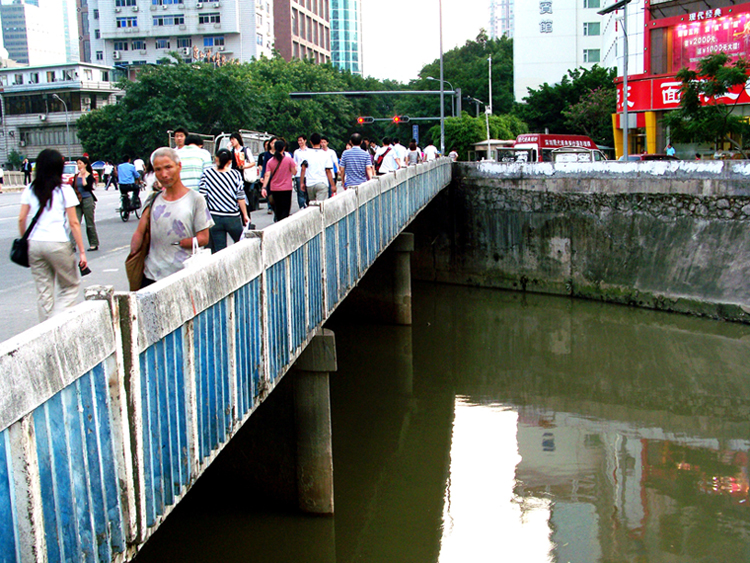By Violet Law
SHENZHEN, China – In 30 years this former farming village of a few thousand peasants has mushroomed into a sprawling metropolis of 11 million people. Where thatched-roof mud huts once dominated the landscape, glazed-glass condo towers now gleam in the sunlight and smokestacks in factory compounds belch charcoal black fumes.
As China’s first boomtown since the country began its economic reforms in the late 1970s, Shenzhen has experienced the kind of population growth and industrial expansion that inevitably causes problems for rivers and canals.
The Buji River runs through the heart of Shenzhen. . But ask local people. They say the waterway is more a sewer than a river.
“The smell is at its worst when the sun comes out shortly after the rain,” said Sheng Hai Pu, whose office overlooks the river. “The sun causes the water to evaporate off the river’s surface. That’s when the stench really hits you right in the face.”
While denizens of the developed world often take for granted that the rivers they live by are mostly clean enough for sightseeing and water sports, rivers in developing countries can be a world apart. In China, the fastest-growing developing country of all, as much as 70 percent of the waterways are polluted.
Shenzhen, the fastest growing city in the fastest growing country, is the poster child of how rapid industrial development and population expansion have turned urban rivers into repositories of waste and neglect.
The river originates near the hamlet of Buji, 11 miles north of Shenzhen and takes its name from the hamlet. The river winds through a dense corridor of factories. In Shenzhen it flows into the Shenzhen River and eventually into the South China Sea.
The Buji’s upper reaches are a popular dumping ground for constantly-humming factories making everything from baby toys to heavy machinery. In the winter of 2007, the river was blanketed with diesel oil so thick that it clogged the filter of the lone sewage treatment plant along its banks.
As the river flows through Shenzhen, it gives off a raw, briny odor. It flows sluggishly, like a thick soup, its color a dull gray-green. A railroad follows alongside. Framed by tall, tree-lined banks, the river runs 20 feet below street level. Well before people see the river, they smell it. The odor has earned it a nickname: Stinky Ditch.
At his office along the river, Mr. Pu sells real estate. The front door of the office looks onto the river bank. When the river is ripe, Up said, potential customers stay away.
Some of the worst days for the Buji came in February. An abandoned garbage dump spilled tons of untreated trash into the river just upstream from downtown. The dump, closed since 1995, had not been built with the protective rubber membrane that the government now requires. Workers spent days dragging the garbage out of the river. Chinese officials acknowledged that the same kind of accident could happen again while they figure out a way to fortify the walls of the dump. They say that another water treatment plant will begin operating next year and will treat more of the raw sewage that now pours into the river.
For now, Chinese officials say they are more concerned about the danger of swollen rivers flooding than in cleaning up the rivers.
“First and foremost, management of rivers is about flood control,” said Wen Bo Zhu, vice president of the Shenzhen Water Resources Planning and Design Institute, a government agency.
“But as a city grows,” he said. “there comes the demand for rivers to also serve as recreational and ecological outlets. The people demand clean and clear waterways.”
In fact, a wetland park and nature reserve is being planned near the juncture of the Buji and Shenzhen Rivers. The park will be required to meet international environmental standards.
“This will push the government to clean up the water,” says Bena Smith, who monitors wetland reserves in the region as a Hong Kong-based manager with the World Wildlife Fund.
Still, Mr. Zhu, the government official, said the government cannot solve all the problems. “The public, too, has a part to play in cleaning the waters,” he said. “We need to instill this kind of public awareness.”
Environmental experts say that it may be some time before a new consciousness takes root in a China that has focused more on production of goods than on the protection of environmental resources.
As part of the government’s cleanup, workers in bright orange jackets scoop the river every day with long handled nets. Working like fishermen, these river sweepers rarely / bring up an empty net. Garbage piles up around them: soda cans, old plastic bags, wads of paper, tree limbs, rags – the flotsam of a mushrooming city.
People walking along the river banks often add to the river’s mess. Sometimes, without even looking, they toss banana peels, unwanted newspapers and empty water bottles into the river. They walk right past the big government sign saying in Chinese and fractured English: “The Clean Water And The Beautiful Water Is The Civilized Language Between Human Beings And Nature.”

